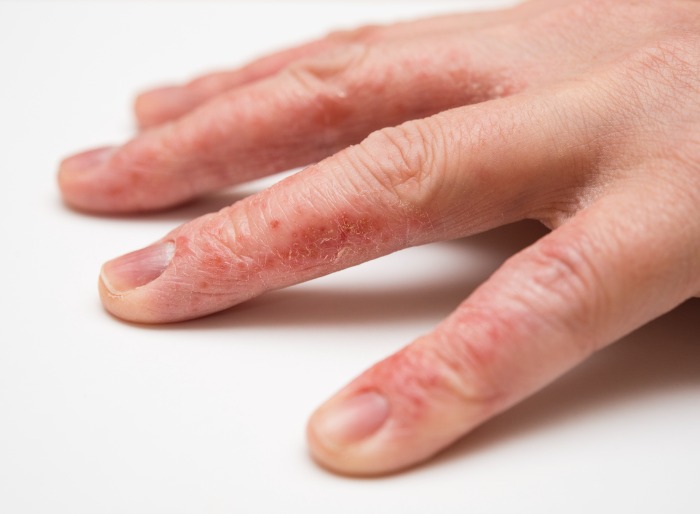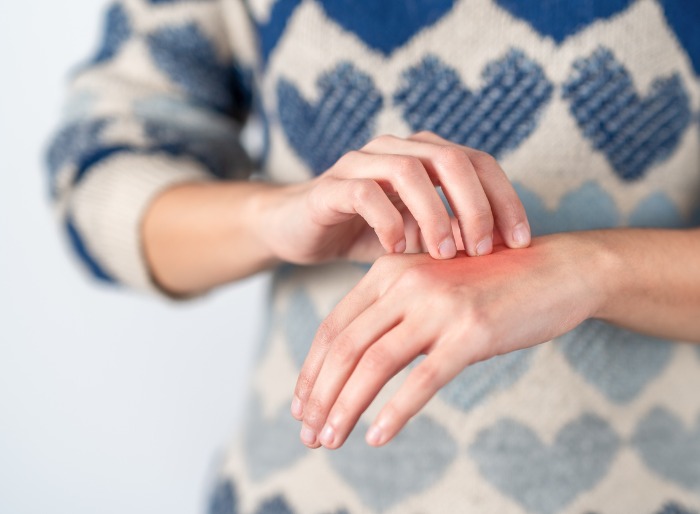The hands are prime targets for hand eczema, one of the most common types of eczema that produces dry, itchy, and red skin on the palms and fingers that can crack and bleed. Hand eczema is not contagious, however, individuals may feel self-conscious about it, as it is visible to others. Skin conditions like eczema are typically life-long and require a dermatologist’s help to find effective relief. At Dermatology Associates, our Gainesville dermatologists provide patients with the highest-quality medical dermatology treatments available with personalized treatment plans, compassionate support, and state-of-the-art equipment. Whether you have mild or severe eczema affecting your hands or multiple areas of your body, we can help you find the right treatment for your needs. Contact us today to schedule an appointment for eczema treatment and achieve clear, healthy skin.

What Is Hand Eczema?
Hand eczema, commonly called hand dermatitis, is a common inflammatory disorder that affects the skin on the hands, causing the skin to become inflamed, red, itchy, and painful on the palms and/or fingers. Eczema is a chronic condition, meaning that a person with eczema will likely have it throughout their life. However, symptoms of eczema come and go and can be managed with certain lifestyle changes and dermatology treatments. Hand eczema is fairly widespread and can occur at any age. This condition is not contagious, though hand eczema flare-ups can affect a person’s ability to perform regular, daily functions.
What Causes Hand Eczema?
The skin comprises an important part of the overall immune system, helping protect the body against infection and bacteria. In addition, skin contains specialized cells that actively destroy antigens, or invading foreign proteins, like bacteria and viruses. In people diagnosed with eczema, their immune system overreacts in the skin, causing it to become red, itchy, and inflamed. Both genetics and exposure of the skin to a wide range of irritants can play a role in triggering hand eczema. While the exact causes of hand eczema are widely unknown, research indicates genetic and environmental factors may lead to inflammation, resulting in an allergic reaction.
Irritant Hand Dermatitis
Irritant hand dermatitis, also known as irritant contact dermatitis of the hands, results from contact with irritants like dust, detergents, cleaning agents, airborne chemicals, or actions such as frequent hand-washing. As with the skin on the soles of the feet, the skin on the palms is typically much thicker than the skin located elsewhere on the body. As such, this skin can withstand significant exposure to many irritants. However, in those who regularly immerse their hands in solvents, detergents, and other chemical irritants, the skin’s protective barrier breaks down, possibly resulting in the development of hand eczema.
Allergic Hand Eczema
Allergic hand eczema, also known as allergic contact dermatitis of the hands, develops due to an allergic reaction to a particular substance within the environment. An individual can be or become allergic to multiple different substances. Common culprits behind contact dermatitis can include fragrances, preservatives, nickel, and various plants, among other allergens. When an individual’s immune system identifies a substance as harmful to the body, the immune system reacts to the substance each time the skin becomes exposed to the substance and may develop in severity with each exposure to the allergen or substance.
Dyshidrotic Eczema
Dyshidrotic eczema, also known as pompholyx eczema or dyshidrotic dermatitis, is a form of chronic hand eczema and foot eczema. Typically, dyshidrotic eczema is a chronic skin condition causing a burning, itching sensation on the skin. In severe cases, it may also cause a blistering rash on the palms of hands, sides of fingers, and the soles of feet. It is most common in individuals 20–40 years of age, though it may arise at any age. Dyshidrotic eczema is a specific skin inflammation that can cause mild-to-severe symptoms. In some cases, symptoms dissipate a few weeks after presenting. More often, however, this condition develops over many months or years.
Who Gets Hand Eczema?
Individuals who have eczema during childhood have a high likelihood of developing hand eczema. Additionally, it can also occur as an occupational skin condition, particularly among healthcare workers, food handlers, hairdressers, and others who come into frequent contact with chemicals, water, and other substances. Individuals with atopic dermatitis, those with allergies, those exposed to allergens or irritants, smokers, those receiving UV radiation, and those with overactive sweat glands may be at a higher risk of developing dyshidrotic eczema. Coming into contact with certain substances that cause allergic reactions and exposure to cold temperatures, dehydration, stress, and sweating can all irritate the skin and result in a flare-up.
Hand Eczema Symptoms
The affected areas of skin can feel hot, painful, rough, scaly, and itchy, and may develop small, itchy hand eczema blisters or painful cracks in the skin, resulting in pain when moving the fingers and hands. In hand dermatitis, the skin is inflamed, red, and swollen, with a damaged, dry, or scaly surface that may appear flaky. There can be cracked areas on the hands or fingers that bleed and ooze. In some cases, small blisters can be seen on the palms or the side of the fingers. Different areas of the hands may be affected, such as the skin between fingers, fleshy fingertips, or the center of the palms.
How Is Hand Eczema Diagnosed?
Our dermatologists in Gainesville can diagnose hand eczema by carefully examining the skin. Examining other body areas will confirm whether the eczema is isolated or a widespread skin condition. Identifying the specific cause of a person’s hand eczema involves identifying the pattern of dermatitis flare-ups and highlighting potential triggers. Techniques such as patch testing can be used to identify if a specific allergy causes allergic contact dermatitis. Factors considered when diagnosing eczema can include whether the condition is acute, relapsing or chronic; any past history of skin disease; whether or not dermatitis is present on other body areas; and the person’s occupation and hobbies. Determining the cause and triggers behind hand dermatitis can be complex as the condition may be multifactorial. A biopsy and skin scrapings may be necessary to test and exclude other inflammation causes on the hands.
If you have extremely dry, painful, red, inflamed, or itchy hands and using moisturizer fails to bring you relief, it’s important to contact a trusted dermatology specialist to schedule an appointment for treatment. Without treatment and preventative measures, hand eczema tends to worsen in severity and symptoms.
What Are The Complications Of Hand Eczema?
Hand dermatitis may become infected with certain bacteria, such as Staphylococcus and Streptococcus. When infected with either bacteria, the hands can develop more severe redness, soreness, crusting, bleeding, oozing, pustules, and lesions. When dermatitis affects the ends of the fingers or the fingertips, it may deform the nails and nail beds. In some cases, dermatitis can spread to other areas separate from the hands, such as the forearms and feet. Contact our office for additional information about the complications of hand dermatitis.
How To Treat Hand Eczema
In most cases, successful treatment for hand eczema can control symptoms of the condition but is not a cure. Early treatment may help patients avoid long-term issues related to hand dermatitis. In people suffering from allergic hand eczema, avoiding the allergen, or allergens, that cause flare-ups may aid in or even clear the hand dermatitis. There are multiple options available for hand dermatitis treatment, including prescription moisturizers, topical steroids, ultraviolet (UV) therapy or phototherapy, and wearing gloves, among other treatment protocols. For more information about your treatment options, please contact Dermatology Associates to schedule an appointment.
Moisturizers
Emollients, or moisturizers, are an integral aspect of treating hand eczema. Moisturizers help repair damaged outer layers of skin and allow the skin to retain essential moisture, restoring a soft, supple texture to the skin. Certain emollients can likewise reduce the risk of secondary bacterial infections. Your dermatologist will recommend or prescribe the optimal moisturizer for your hand-eczema treatment needs.
Topical Medications
Topical steroids are used to treat active eczema flare-ups by reducing inflammation in the affected area and reducing the severity of redness and irritation in the skin. The hands typically require a strong steroid, as the skin of the palms is thick, so your dermatologist may prescribe a potent topical steroid based on your needs. Topical steroids are generally used in short bursts. If the skin is infected, you may be prescribed a topical antibacterial or antimicrobial treatment in a cream or an oral form. Multiple newer topical medications are also used to maintain eczema once steroids calm the flare.
Gloves
In addition to establishing a good skincare routine and using or taking any prescribed medications, wearing gloves can help protect your hands from contact with irritants and allergens. The gloves you choose should provide complete protection and maintain a dry environment inside the gloves. Even when eczema is cleared, the hands may be extremely sensitive, so gloves can help protect your hands from harm. Generally, protective gloves should be used over barrier creams.
Phototherapy
Phototherapy, or UV therapy, uses either UVA or UVB rays to help treat hand eczema. Exposing the skin to UV light suppresses overactive immune system cells that cause inflammation, producing an anti-inflammatory effect on the treated skin. Light therapy also smoothes lesions, decreasing skin thickening. Light therapy works well for many people with targeted eczema, such as hand eczema, as dermatologists can specifically target these areas with light. This treatment is non-invasive, and can help reduce the need to use other medications for treatment.

Can Hand Eczema Be Prevented?
A significant element of hand eczema treatment includes avoiding the cause of the flare-ups. Your dermatologist may advise you to follow these preventative steps:
- Wear gloves when washing dishes
- Use mild, soaps and detergents without fragrances
- Use recommended emollients to protect your hands
- Apply moisturizer after you wash your hands
- Use a humidifier at home to prevent dryness and itchiness
- Avoid hot baths and showers as well as hot tubs or spas
- Apply and reapply adequate sun protection to exposed skin
- Drink plenty of water to maintain adequate hydration
- Consume anti-inflammatory foods and a plant-rich diet